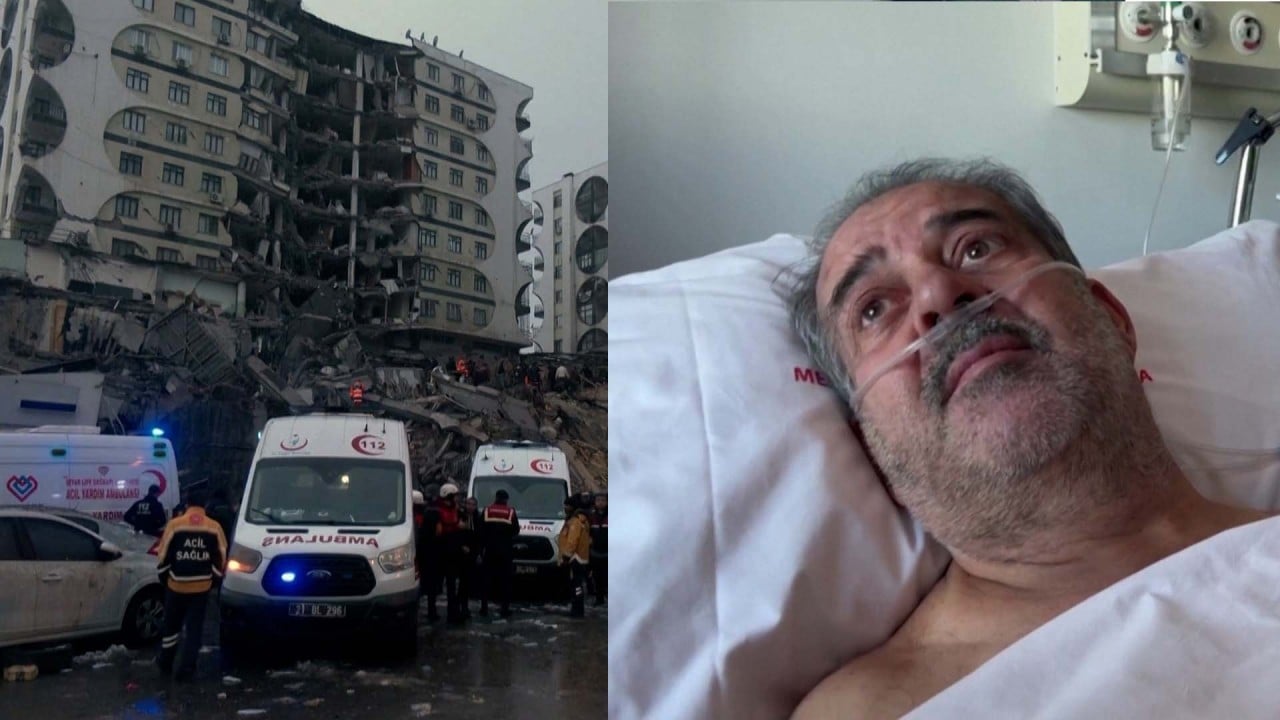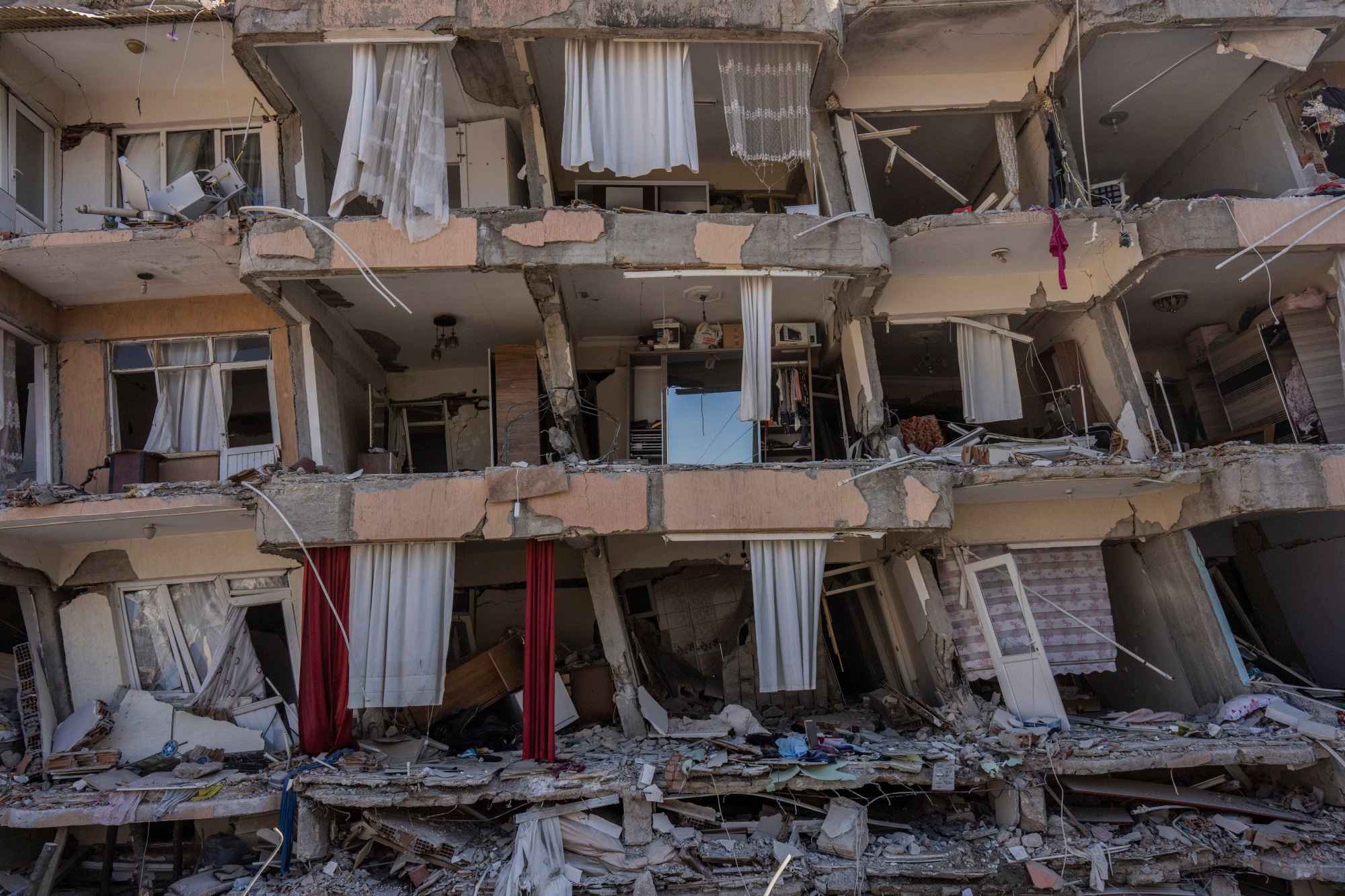
02:28
'Drinking my urine saved me': Turkish man survives 187-hour ordeal after quake
Turkey-Syria earthquake: Huseyin Berber’s story of survival under the rubble
- Huseyin Berber had a single bottle of water, and when that ran out, drank his own urine
- Earthquake has killed more than 41,000 in southeast Turkey and northwest Syria
Huseyin Berber’s voice was hoarse from calling for help from under the rubble of his home but he was finally freed more than a week after Turkey’s massive earthquake, defying the odds for survival and one of several remarkable stories to emerge.
Doctors say people can last, even without water, for days. But there are so many variables – what injuries were sustained in a building collapse and how hot or cold is it outside – that rescuers say anything after five days is miraculous.
The earthquake has killed more than 41,000 people across swathes of southeast Turkey and northwest Syria, becoming the area’s deadliest natural disaster in centuries.
Erdogan vows to rebuild as Turkey-Syria quake toll rises
Berber, a 62-year-old diabetic, survived 187 hours after the walls of his ground floor flat were propped up by a fridge and a cabinet, leaving him an armchair to sit in and a rug to keep him warm.
He had a single bottle of water, and when that ran out, drank his own urine.
Berber was speaking from a bed at Mersin City Hospital, some 250km from the 15-storey building that collapsed in the city of Antakya in southern Hatay province, where half the buildings were either destroyed or heavily damaged. He was admitted on Tuesday.

He said he had been surrounded by relatives in different rooms in his flat, all of whom he believes managed to survive.
“When the earthquake hit, I immediately stood up, my grandchild was sleeping next to me. I looked around, my son turned on a light, took a flashlight and said ‘Father, it’s an earthquake!’
“In a second tremor, the ceiling collapsed, but it did not touch me. I immediately crouched, sat down. The wall fell over on to fridge and the cabinet. I was stuck there. There was a rug. I took that and put it over me … I saw there was a armchair, I climbed over it took the rug and sat there.
“I shouted, shouted and shouted. No one was hearing me. I shouted so much that my throat hurt. Our son, I think took out the kids … we were five people, my son and I were in the bedroom.”
He said he found his diabetes medicine and a bottle of water on the floor.
“An hour later, I took (the water bottle) and drank it. Apologies, I peed in it and let it rest. I drank it when it got cold. I saved myself with that.”

A member of the Turkish medical rescue team said people under the rubble can generally survive up to five days. “Anything beyond five days is a miracle,” he said.
Deniz Gezer, internal medicine specialist at Mersin City Hospital, said one of the biggest problems for survival was the cold.
“But some of the patients stayed in closed areas, so they can live under buildings, in small closed spaces. Some have water with them.”
Mohana Amirtharajah, a surgery adviser with Medecins Sans Frontieres, said dehydration happens faster in children.
Why did buildings in quake-hit Turkey collapse so easily?
Asked whether drinking urine was a genuine survival, strategy, she said she would not recommend it.
“But there are definitely case reports of people who survive in that way. But what you will find over time is you become more and more dehydrated, is that your urine becomes more and more concentrated. So the actual water content of your urine will go down.”
Berber, in his hospital bed, surrounded by beeping machines, said he thought no one was going to save him.
“I was here, they were there. I climbed next to the cabinet, I am reaching out to the ceiling but I cannot touch it. But on the other side of the room it collapsed on to the bed. Our son brought three diggers, they are digging. I was hitting the ceiling, I saw it is punctured, I heard a voice, I shouted.

“Someone reached their hand out and it met with my hand. They pulled me out from there. The hole I got out from was very small. That scared me a bit.
“I do not remember anything after they pulled me out. I was rescued, I got out, I wanted water and food, especially water. I did not eat anything, there was nothing to eat.
“ … It means, I did good deeds with Allah, I stayed in Mecca seven years, haj, umra, prayers, for everyone not only for my family. I think because of that God saved me.”
Caglar Aksoy Colak, a doctor at Mersin City Hospital, said doctors only provided “supportive treatment” for Berber.
“He has no broken bones, his general status is fairly good … He actually inspired himself down there. Our patient came out in a very good condition.”
Additional reporting by Agence France-Presse
How to help
Turkish Consulate General Hong Kong
Unicef Hong Kong
Oxfam
Save the Children
World Vision Hong Kong
Red Cross
Medecins Sans Frontieres (MSF)

